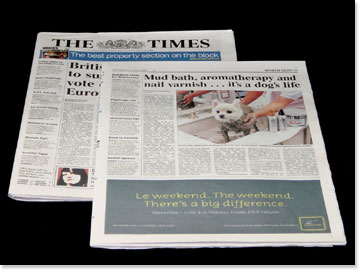 |


 |


Mud bath, aromatherapy and nail varnish's it's a dog's life
From Richard Lloyd Parry in Tokyo
IT IS not cheap but, given the complexity of Merry Do Natural Mud's ingredients, that is no surprise. Seaweed extract and jojoba oil mingle with saponaria extract and squalene. Horsetail essence is combined with mud shipped in from the Dead Sea, the German coast and southwest Japan.
Yet the most remarkable thing about this beauty treatment is not its expense but its target customer. At 13,125 yen (£67) a time, Natural Mud is a top-end, de luxe beauty therapy aimed not at highmaintenance Japanese women but their dogs.
Having gone as far as it seemed possible to go in dressing, grooming and pampering pets, Japan's dog beauty parlours have scaled new heights with a range of products which include mud baths and nail varnish for the animals. Early signs are that the idea is a success. Since being introduced last year, the products have sold in China, Taiwan, Singapore, Thailand, Malaysia, New Zealand and Australia. Now there are plans to take them to Britain.
"Pet Esthé's philosophy is to beautify the total pet, beginning with the emotions," says the website of the Merry Do company. "Thus, in accordance with the scientific approach to pet care ... we apply aromatherapy and thalassotherapy to pets."
"Use of pet salons has become popular among sophisticated people," Masahiro Tsunoda, the president of Merry Do Beauty Products, said. "For them they are more than a pet, and a member of the family. Naturally they come to think their pets should have the same kind of treatment they have and, through them,they too feel relaxed."
According to Miho Chinda, a pet "aesthetician" at the Salon Pompreece pet beauty parlour in Tokyo, 30 to 40 customers a month take advantage of the Pet Esthé range. Ms Chinda said: "Once they experience Esthé, they notice that their pets' hair becomes softer or the skin becomes velvety after bathing in a hot spring or mud therapy. Dogs seem to feel good after mud therapy and a massage. Cats are a bit more difficult to deal with."
As well as a range of ten pet nail colours (from lameé to lemon yellow), the range includes mild amino-acid shampoo, aromatic eau de toilette and anti-slip paw-pad spray to guard against tumbles on snow,ice or polished wooden floors.All are made from natural ingredients and are designed to avoid aggravating canine allergies. "These days a lot of pets suffer from allergies," Mr Tsunoda said. "For them chemical products are not ideal."
Prices depend on the size and hairiness of the dog. A dip in a hot spring for a small chihuahua or dachshund is as cheap as 2,625 yen. The same treatment, combined with mud therapy and a haircut, will cost the owner of a cocker spaniel 19,425 yen.
In the past five years there has been an explosion of pet pampering in Japan. Dogs in hats, jackets and sunglasses are so routine in Tokyo that the sight of a nude pet is almost shocking.
Some analysts connect the idolatry of animals to the dwindling numbers of human children. Figures published this week reveal that the average Japanese women produces 1.29 children in a lifetime, the lowest known birthrate that the naition has experienced.
However, the cult of pet pampering has distinguished historical precedents. In the 17th century, Japan's fifth shogun, Tokugawa Tsunayoshi, imposed harsh punishments on anyone who harmed a dog, and constructed the country's first dogs' home. He was known as the dog shogun.



|
|